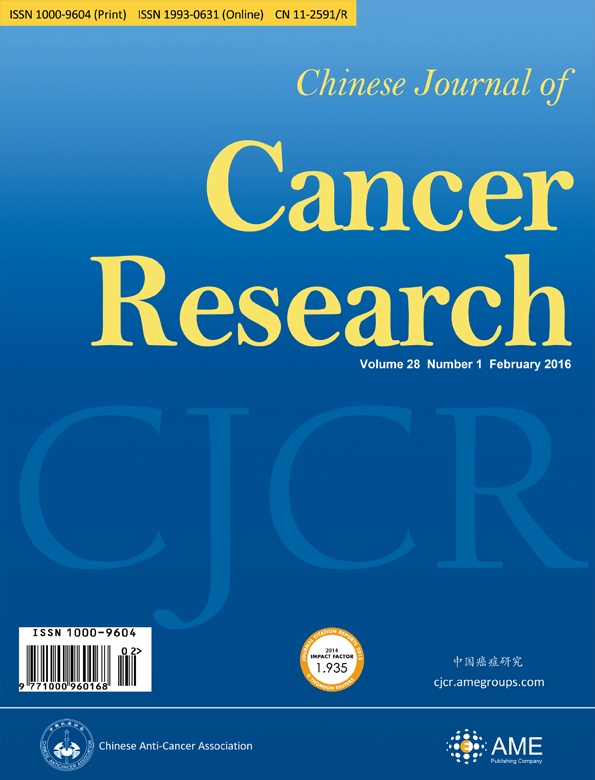Association of cancer prevention awareness with esophageal cancer screening participation rates: Results from a population-based cancer screening program in rural China
IF 7
2区 医学
Q1 ONCOLOGY
引用次数: 10
Abstract
Objective China have implemented population-based esophageal cancer (EC) screening programs, however, the participant rates were relatively low. This study was conducted to examine the association between cancer prevention knowledge and EC screening participation rates (PRs). Methods Data in the analyses were obtained from a population-based cancer screening program in four provinces in China since 2007. In the course of 2007−2016, participants who were evaluated as high risk for EC and subsequently recommended for endoscopy examination were included in the final analysis. One-way analysis of variance test, Chi-square test and logistic regression analysis were applied. Results A total of 28,543 individuals assessed as high-risk population for EC were included in this study, with 13,036 males (45.67%) and 15,507 females (54.33%). The prevalence rates of current smoking and alcohol drinking were higher in males (58.25% and 44.22%, respectively) than in females (5.35% and 4.05%, respectively). Participants of females, and those who had older age, lower income, as well as higher education level and cancer prevention knowledge level were more likely to undergo endoscopy. Multivariable analysis showed that higher cancer prevention knowledge was associated with higher PR for endoscopic screening [adjusted odd ratio (aORQ4/Q1) =1.511, 95% confidence interval (95% CI): 1.398−1.632] among our study subjects. This association between cancer prevention knowledge and compliance with endoscopic screening also tends to be strong within subgroups of males, females, aged below 60 years, aged 60 years and above, and lower level of education (illiterate individuals and those with junior high education or less). Conclusions Our results displayed a positive relationship between cancer prevention knowledge and PRs for endoscopic screening, implying cancer prevention awareness being an independent influence factor for compliance with EC screening. Promoting public campaigns about comprehensive knowledge of cancer prevention seemed to be a reasonable and effective strategy to improve population PRs for EC screening.癌症预防意识与食管癌症筛查参与率的关系:中国农村基于人群的癌症筛查项目的结果
目的我国已实施以人群为基础的癌症筛查项目,但参与率相对较低。本研究旨在检验癌症预防知识与EC筛查参与率(PR)之间的关系。方法自2007年以来,从中国四个省的癌症筛查项目中获得分析数据。在2007-2016年期间,被评估为EC高风险并随后建议进行内窥镜检查的参与者被纳入最终分析。采用单因素方差分析、卡方检验和逻辑回归分析。结果本研究共纳入28543名EC高危人群,其中男性13036人(45.67%),女性15507人(54.33%)。目前吸烟和饮酒的患病率男性(分别为58.25%和44.22%)高于女性(分别为5.35%和4.05%)。女性参与者以及年龄较大、收入较低、教育水平和癌症预防知识水平较高的参与者更有可能接受内窥镜检查。多因素分析显示,在我们的研究对象中,癌症预防知识越高,内窥镜筛查的PR越高[调整后的奇数比(aORQ4/Q1)=1.511,95%置信区间(95%CI):1.398−1.632]。癌症预防知识与内窥镜筛查依从性之间的这种关联在男性、女性、60岁以下、60岁及以上以及教育水平较低的人群(文盲和初中或初中以下)中也很强。结论癌症预防知识与内镜筛查的PRs呈正相关,提示癌症预防意识是EC筛查依从性的独立影响因素。促进公众宣传癌症预防的全面知识似乎是改善EC筛查人群PR的合理有效策略。
本文章由计算机程序翻译,如有差异,请以英文原文为准。
求助全文
约1分钟内获得全文
求助全文
来源期刊
自引率
9.80%
发文量
1726
审稿时长
4.5 months
期刊介绍:
Chinese Journal of Cancer Research (CJCR; Print ISSN: 1000-9604; Online ISSN:1993-0631) is published by AME Publishing Company in association with Chinese Anti-Cancer Association.It was launched in March 1995 as a quarterly publication and is now published bi-monthly since February 2013.
CJCR is published bi-monthly in English, and is an international journal devoted to the life sciences and medical sciences. It publishes peer-reviewed original articles of basic investigations and clinical observations, reviews and brief communications providing a forum for the recent experimental and clinical advances in cancer research. This journal is indexed in Science Citation Index Expanded (SCIE), PubMed/PubMed Central (PMC), Scopus, SciSearch, Chemistry Abstracts (CA), the Excerpta Medica/EMBASE, Chinainfo, CNKI, CSCI, etc.

 求助内容:
求助内容: 应助结果提醒方式:
应助结果提醒方式:


